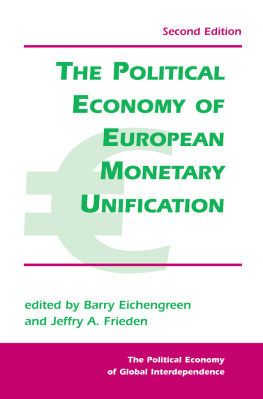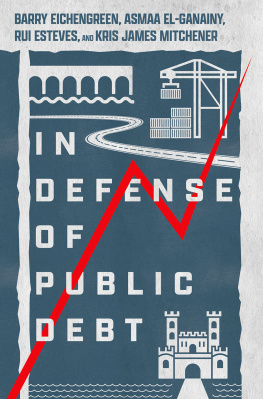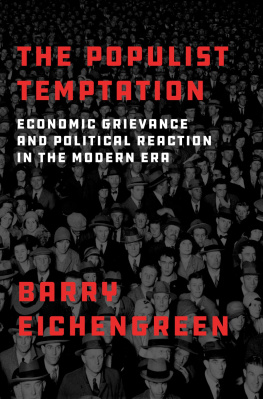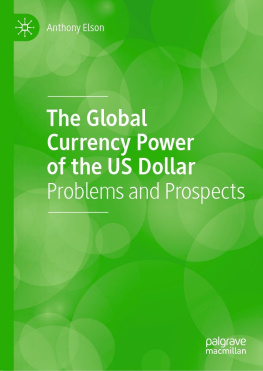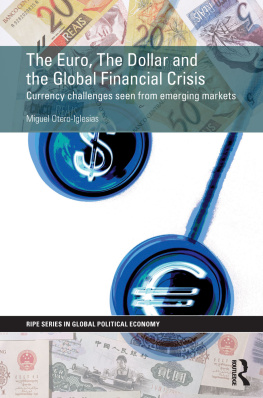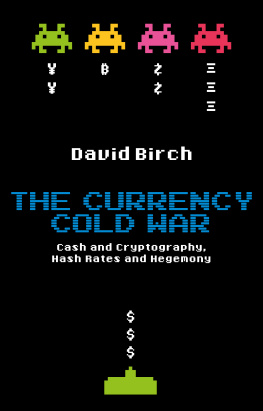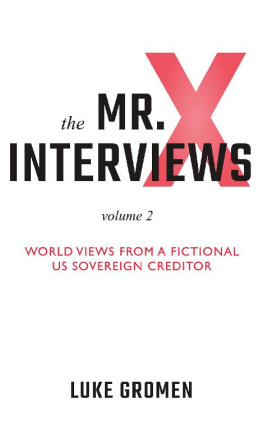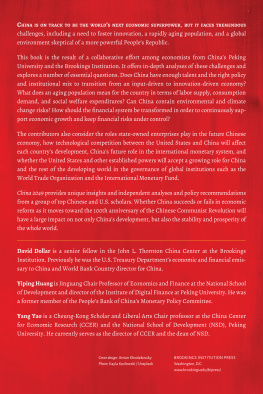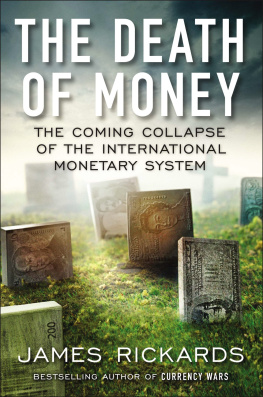EXORBITANT PRIVILEGE
EXORBITANT
PRIVILEGE
The Rise and Fall of the Dollar and the Future
of the International Monetary System
Barry Eichengreen


Oxford University Press, Inc., publishes works that further
Oxford Universitys objective of excellence
in research, scholarship, and education.
Oxford New York
Auckland Cape Town Dar es Salaam Hong Kong Karachi
Kuala Lumpur Madrid Melbourne Mexico City Nairobi
New Delhi Shanghai Taipei Toronto
With offices in
Argentina Austria Brazil Chile Czech Republic France Greece
Guatemala Hungary Italy Japan Poland Portugal Singapore
South Korea Switzerland Thailand Turkey Ukraine Vietnam
Copyright 2011 by Barry Eichengreen
Published by Oxford University Press, Inc.
198 Madison Avenue, New York, NY 10016
www.oup.com
Oxford is a registered trademark of Oxford University Press
All rights reserved. No part of this publication may be reproduced, stored in a retrieval system, or transmitted, in any form or by any means, electronic, mechanical, photocopying, recording, or otherwise, without the prior permission of Oxford University Press.
Library of Congress Cataloging-in-Publication Data
Eichengreen, Barry J.
Exorbitant privilege : The Rise and Fall of the Dollar and the Future
of the International Monetary System / Barry Eichengreen.
p. cm.
Includes bibliographical references and index.
ISBN 978-0-19-975378-9
1. MoneyUnited StatesHistory20th century.
2. Devaluation of currencyUnited StatesHistory21st century.
3. United StatesEconomic policy2009
4. Financial crisesUnited States21st century.
I. Title.
HG540.E33 2010
332.4973dc22 2010018239
1 3 5 7 9 8 6 4 2
Printed in the United States of America
on acid-free paper
CONTENTS
EXORBITANT PRIVILEGE
CHAPTER 1
INTRODUCTION
The Counterfeiters, an award-winning German film set in 1940s Europe, opens with the concentration camp survivor Salomon Sorowitsch, played by the Austrian actor Karl Markovics, sitting fully clothed on the beach holding a suitcase full of dollars. The war has just ended, and he intends to put that currency, of dubious provenance, to work on the tables of Monte Carlo. That it is dollars rather than French francs is essential to the authenticity of the scene. In postWorld War II Europe it was the dollar, the currency of the only major economy still standing, that people in all countries wanted. Dollars were the only plausible currency that a Holocaust survivor might carry into a casino in 1945.
Fast forward now 50-odd years. In City of Ghosts, a 2002 thriller set in contemporary Cambodia, the hero, a crooked insurance salesman played by Matt Dillon, uses a suitcase full of dollars to ransom his partner and mentor, played by James Caan, who has been kidnapped by business associates. More than half a century of cinematic time has passed and the location is now developing Asia rather than Europe, but the suitcase still contains dollars, not Japanese yen or Chinese renminbi. That any self-respecting kidnapper would expect the ransom to be paid in dollars is so obvious as to go unstated.
The suitcase full of dollars is by now a standard trope of mystery novels and Hollywood screenplays. But this artistic convention reflects a common truth. For more than half a century the dollar has been the worlds monetary The fact that nearly three-quarters of all $100 bills circulate outside the United States attests to the dollars dominance of this dubious realm.
But what is true of illicit transactions is true equally of legitimate business. The dollar remains far and away the most important currency for invoicing and settling international transactions, including even imports and exports that do not touch U.S. shores. South Korea and Thailand set the prices of more than 80 percent of their trade in dollars despite the fact that only 20 percent of their exports go to American buyers. Fully 70 percent of Australias exports are invoiced in dollars despite the fact that fewer than 6 percent are destined for the United States. The principal commodity exchanges quote prices in dollars. Oil is priced in dollars. The dollar is used in 85 percent of all foreign exchange transactions worldwide. It accounts for nearly half of the global stock of international debt securities. It is the form in which central banks hold more than 60 percent of their foreign currency reserves.
This situation is more than a bit peculiar. It made sense after World War II when the United States accounted for more than half of the combined economic output of the Great Powers. America being far and away the largest importer and main source of trade credit, it made sense for imports and exports to be denominated in dollars. Since the United States was the leading source of foreign capital, it made sense that international financial business was transacted in dollars. And with these same considerations encouraging central banks to stabilize their currencies against the dollar, it made sense that they should hold dollars in reserve in case of a problem in foreign exchange markets.
But what made sense then makes less sense now, when both China and Germany export more than the United States. Today the U.S. share of global exports is only 13 percent. The United States is the source of less than 20 percent of foreign direct investment, down from nearly 85 percent between 1945 and 1980.
These two changes are both manifestations of the same fact: the United States is less dominant economically than 50 years ago. This fact reflects the progress of other economies, first Europe, then Japan, and most recently emerging markets like China and India, in closing the per capita income gap. Economists refer to this narrowing as catch-up or convergence. It is entirely natural insofar as there is no intrinsic reason that U.S. incomes and levels of labor productivity should be multiples of those in the rest of the world. This process of catch-up is one of the great achievements of the late twentieth and early twenty-first centuries in that it has begun lifting out of poverty the majority of the worlds population. But it also means that the United States accounts for a smaller share of international transactions. And this fact creates an uneasy tension with the peculiar dominance of the dollar.
This dominance is something from which we Americans derive considerable benefit. An American tourist in New Delhi who can pay his cab driver in dollars is spared the inconvenience of having to change money at his hotel. The widespread international use of the dollar is similarly an advantage for American banks and firms. A German company exporting machine tools to China and receiving payment in dollars incurs the additional cost of converting those dollars into euros, the currency it uses to pay its workers and purchase its materials. Not so a U.S. exporter of machine tools. Unlike firms in other countries, the U.S. producer receives payment in the same currency, dollars, that it uses to pay its workers, suppliers, and shareholders.
Similarly, a Swiss bank accepting deposits in francs but making foreign loans in dollars, since thats what its customers want, has to worry about the risk to its profits if the exchange rate moves. That risk can be managed, but doing so is an added cost of business. Our Swiss bank can protect itself by buying a forward contract that converts the receipts on its dollar loan into francs when the loan matures, at a rate agreed when the loan is made. But that additional transaction has an additional cost. American banks that make foreign loans in dollars as well as taking deposits in dollars are spared the expense of having to hedge their foreign currency positions in this way.
Next page

